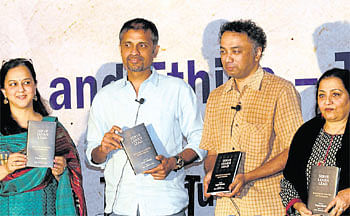A seminar, organised by the Indo-American Chamber of Commerce and the American India Foundation, was recently held in the City.

Titled ‘Leadership and Ethics: The Struggle Within’, the seminar sought to understand the pressures of handling leadership in an ethical manner in today’s world. The panelists included renowned names in the worlds of education, business and development, such as Anurag Behar, the vice chancellor of Azim Premji Foundation; Harish Hande, the managing director of SELCO and Madhu Kishwar, who is a part of the Centre for the Study of Developing Societies. Rohini Nilekani, the chairperson of Arghyam and Pratham Books, was the moderator of the discussion.
The discussion remained an interactive one, with the audience being encouraged to contribute as well. The seminar began with each of the panelists speaking for about five minutes, after which they answered questions and interacted with the audience.
One of the key issues that the panelists tried to address was what it took to lead a team or organisation in an ‘ethical’ manner. Whereas Anurag Behar spoke about the importance of education — and specifically equitable education — in achieving this, Harish Hande questioned the very definition of ‘ethical’ itself. Citing the example of a local slum lord who forced all his residents to adopt a solar power system, he said, “In some cases, it’s good to be unethical. Leadership and ethics mean different things to different people.”
Madhu Kishwar voiced her opinion that leading an ethical life is easy enough, so as long as one doesn’t come too close in contact with government machinery. She also stressed the need for an accurate diagnosis of the problems in leading ethically, because the solution to the problem depends on this.
Metrolife also had a quick chat with Anurag Behar on the issue of how young leadership can benefit all spheres, whether social, political or business-related. He said, “There’s a dreamy-eyed notion that a young leader is different or better than an older one, but this isn’t always true. New people come with fresh ideas and energy, which is useful in all spheres. But there’s still a value in the old. It’s important to strike a balance between both.”
He added that whether young or old, it’s important for all leaders to put aside personal agendas. “They should work for a better India, rather than themselves. Unless our leaders do this, we won’t have a better India,” he concluded.
The seminar also included a book launch of a compilations of essays titled ‘Serve. Learn. Lead’. Authored by the members of AIF’s William K Clinton Fellowship, it was edited by author Rajni Bakshi.